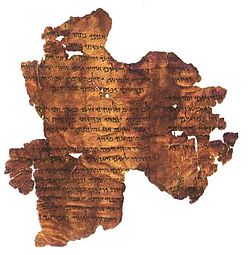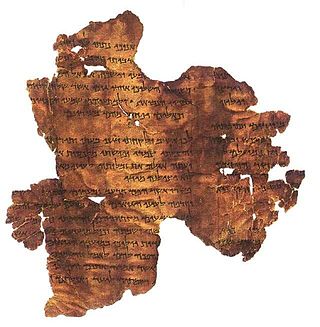
Hosea 1 is the first chapter of the Book of Hosea in the Hebrew Bible or the Old Testament of the Christian Bible. This book contains the prophecies attributed to the prophet Hosea son of Beeri, and this chapter especially sets forth the spiritual whoredom of Israel by symbolical acts. It is a part of the Book of the Twelve Minor Prophets.
Isaiah 34 is the thirty-fourth chapter of the Book of Isaiah in the Hebrew Bible or the Old Testament of the Christian Bible. This book contains the prophecies attributed to the prophet Isaiah, and is a part of the Book of the Prophets. The Jerusalem Bible groups chapters 28-35 together as a collection of "poems on Israel and Judah", although this chapter is addressed to all nations and to Edom in particular.
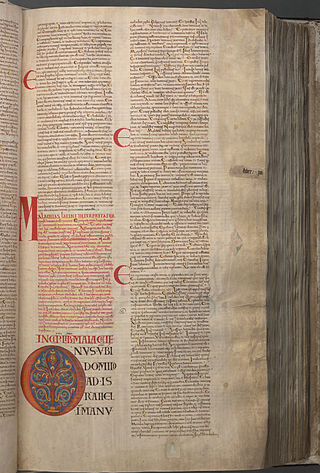
Malachi 1 is the first chapter of the Book of Malachi in the Hebrew Bible or the Old Testament of the Christian Bible. This book contains the prophecies attributed to the prophet Malachi, and is a part of the Book of the Twelve Minor Prophets.
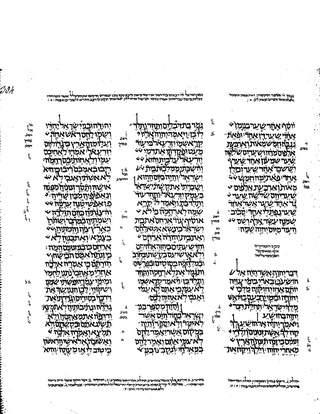
Zechariah 2 is the second of the total 14 chapters in the Book of Zechariah in the Hebrew Bible or the Old Testament of the Christian Bible. This book contains the prophecies attributed to the prophet Zechariah, and is a part of the Book of the Twelve Minor Prophets. This chapter is a part of a section consisting of Zechariah 1–8. It records the third of eight visions received by the prophet, followed by an oracle calling the exiles to return to the city where Yahweh is about to dwell and all nations will come.
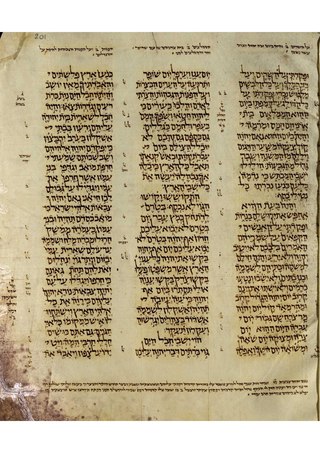
Zechariah 9 is the ninth of the total 14 chapters in the Book of Zechariah in the Hebrew Bible or the Old Testament of the Christian Bible. This book contains the prophecies attributed to the prophet Zechariah, and is a part of the Book of the Twelve Minor Prophets. This chapter is a part of a section consisting of Zechariah 9–14. It concerns about the advance of an enemy, but God defends Jerusalem and his king will triumphantly enter the city to bring peace among all nations. This chapter also contains a continuation of the subject in the seventh chapter. The part about the king's entry into Jerusalem is quoted in the New Testament, especially in the event of Jesus' triumphal entry into Jerusalem.
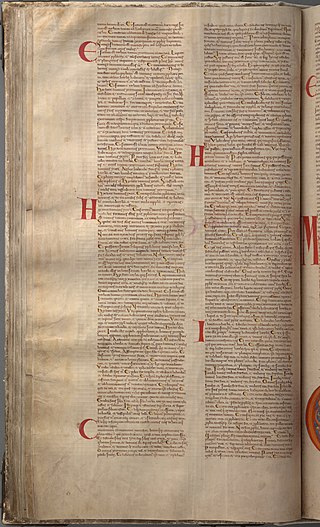
Zechariah 10 is the tenth of the total 14 chapters in the Book of Zechariah in the Hebrew Bible or the Old Testament of the Christian Bible. This book contains the prophecies attributed to the prophet Zechariah, and is a part of the Book of the Twelve Minor Prophets. This chapter is a part of a section consisting of Zechariah 9–14.
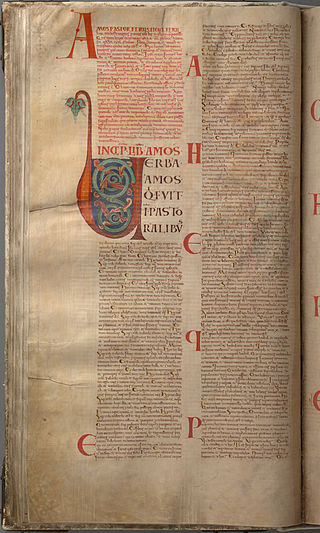
Amos 3 is the third chapter of the Book of Amos in the Hebrew Bible or the Old Testament of the Christian Bible. This book contains the prophecies attributed to the prophet Amos, especially God's extraordinary love, being repaid by Israel with ingratitude, of necessity calls for judgments. It is a part of the Book of the Twelve Minor Prophets.
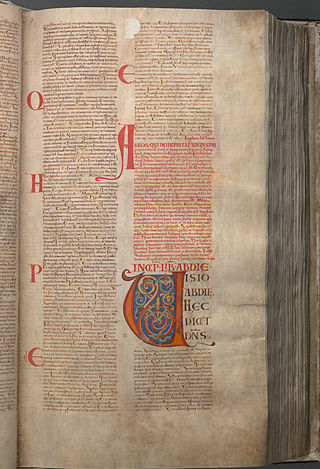
Amos 8 is the eighth chapter of the Book of Amos in the Hebrew Bible or the Old Testament of the Christian Bible. This book contains the prophecies attributed to the prophet Amos; in particular, the seventh, eighth, and ninth chapters contain visions and their explanations. It is a part of the Book of the Twelve Minor Prophets.

Amos 9 is the ninth chapter of the Book of Amos in the Hebrew Bible or the Old Testament of the Christian Bible. This book contains the prophecies attributed to the prophet Amos; in particular, the seventh, eighth, and ninth chapters contain visions and their explanations. It is a part of the Book of the Twelve Minor Prophets.

Hosea 2 is the second chapter of the Book of Hosea in the Hebrew Bible or the Old Testament of the Christian Bible. This book contains the prophecies attributed to the prophet Hosea son of Beeri and this chapter contains the application of the symbols in the first chapter. It is a part of the Book of the Twelve Minor Prophets.

Hosea 5 is the fifth chapter of the Book of Hosea in the Hebrew Bible or the Old Testament of the Christian Bible. The book contains the prophecies attributed to the prophet Hosea son of Beeri and this chapter is about God's judgments against the priests, the people, and the princes of Israel, for their multiple sins, until they repent, a topic which continues to chapter 6. It is a part of the Book of the Twelve Minor Prophets.

Hosea 6 is the sixth chapter of the Book of Hosea in the Hebrew Bible or the Old Testament of the Christian Bible. This chapter contains the prophecies attributed to the prophet Hosea son of Beeri, about an exhortation to repentance and a complaint against Israel and Judah for persisting still in their wickedness. It is a part of the Book of the Twelve Minor Prophets.

Hosea 7 is the seventh chapter of the Book of Hosea in the Hebrew Bible or the Old Testament of the Christian Bible. The book contains the prophecies attributed the prophet Hosea son of Beeri and this chapter is about Israel reproved for multiple sins resulting in God's wrath against them for their hypocrisy. It is a part of the Book of the Twelve Minor Prophets.

Hosea 8 is the eighth chapter of the Book of Hosea in the Hebrew Bible or the Old Testament of the Christian Bible. This chapter contains the prophecies attributed to the prophet Hosea son of Beeri, about the impending destruction to Israel and Judah for their impiety and idolatry. It is a part of the Book of the Twelve Minor Prophets.

Hosea 9 is the ninth chapter of the Book of Hosea in the Hebrew Bible or the Old Testament of the Christian Bible. This chapter contains the prophecies attributed to the prophet Hosea son of Beeri, about the distress and captivity of Israel for their sins, especially their idolatry. It is a part of the Book of the Twelve Minor Prophets.

Hosea 10 is the tenth chapter of the Book of Hosea in the Hebrew Bible or the Old Testament of the Christian Bible. This chapter contains the prophecies attributed to the prophet Hosea son of Beeri, that was declared between Shalmaneser's first and second invasions of Israel, in which Israel is reproved and threatened for their impiety and idolatry, and exhorted to repentance. It is a part of the Book of the Twelve Minor Prophets.

Hosea 11 is the eleventh chapter of the Book of Hosea in the Hebrew Bible or the Old Testament of the Christian Bible. This chapter contains the prophecies attributed to the prophet Hosea son of Beeri, about God's former benefits, and Israel's ingratitude resulting in punishment, but God still promises restoration. It is a part of the Book of the Twelve Minor Prophets.

Hosea 14 is the fourteenth chapter of the Book of Hosea in the Hebrew Bible or the Old Testament of the Christian Bible. This chapter contains the prophecies attributed to the prophet Hosea son of Beeri as an exhortation to repentance and a promise of God's blessing. It is a part of the Book of the Twelve Minor Prophets.

2 Chronicles 1 is the first chapter of the Second Book of Chronicles the Old Testament of the Christian Bible or of the second part of the Books of Chronicles in the Hebrew Bible. The book is compiled from older sources by an unknown person or group, designated by modern scholars as "the Chronicler", and had the final shape established in late fifth or fourth century BCE. This chapter belongs to the section focusing on the kingship of Solomon. The focus of this chapter is Solomon's ascension and wealth.

2 Samuel 7 is the seventh chapter of the Second Book of Samuel in the Old Testament of the Christian Bible or the second part of Books of Samuel in the Hebrew Bible. According to Jewish tradition the book was attributed to the prophet Samuel, with additions by the prophets Gad and Nathan, but modern scholars view it as a composition of a number of independent texts of various ages from c. 630–540 BCE. This chapter contains the account of David's reign in Jerusalem. This is within a section comprising 2 Samuel 2–8 which deals with the period when David set up his kingdom.
